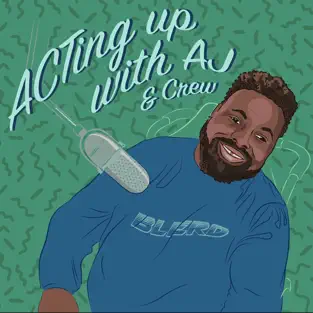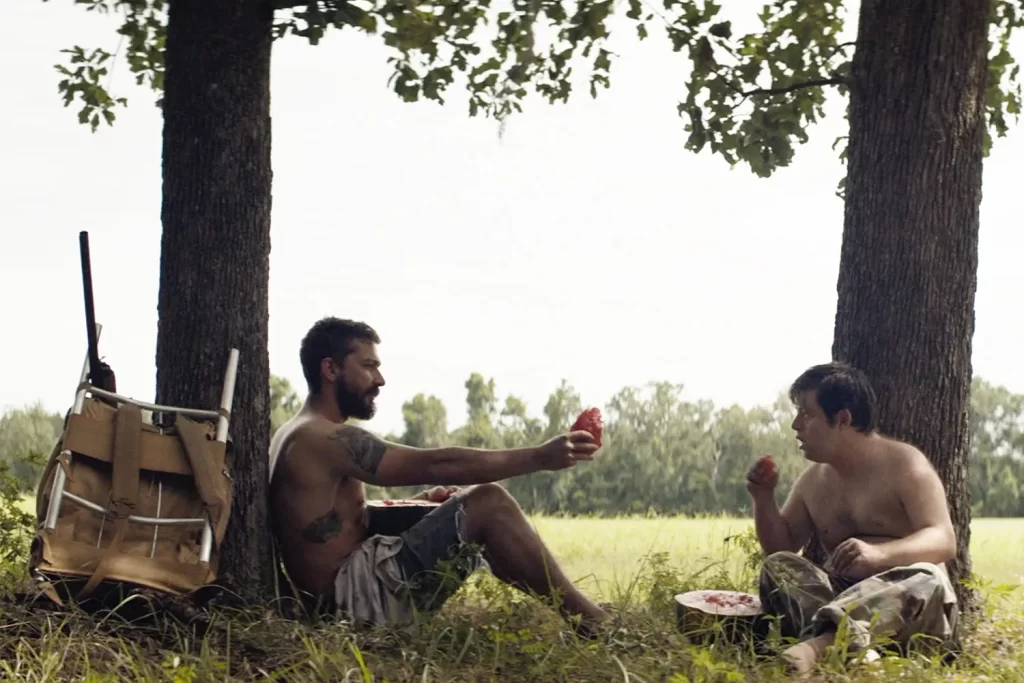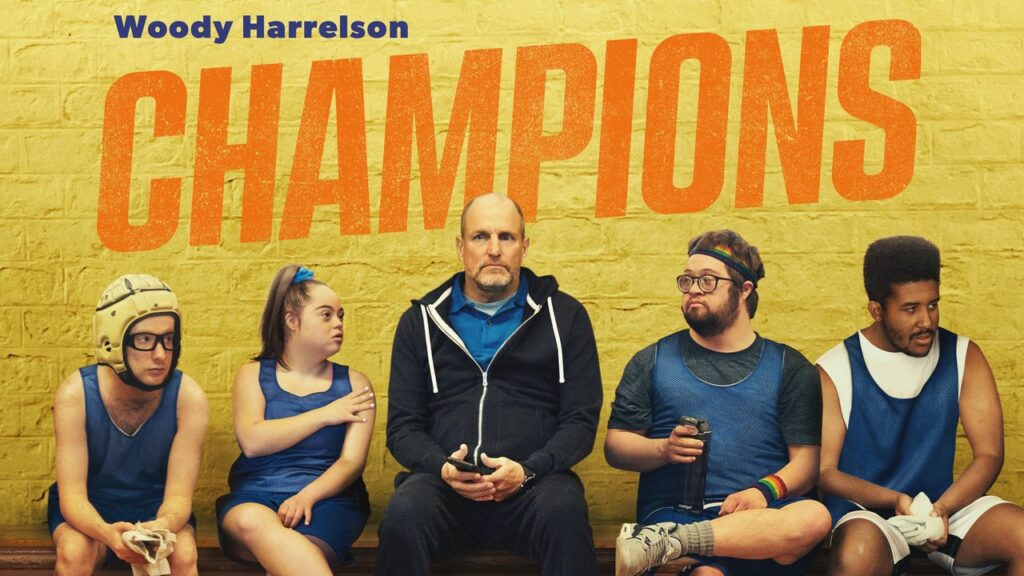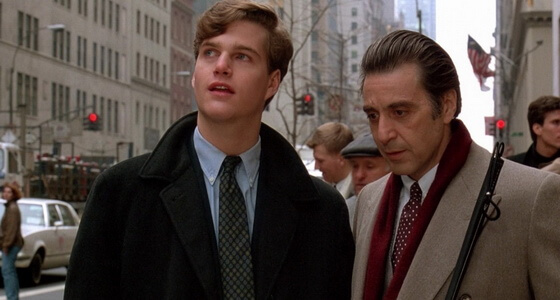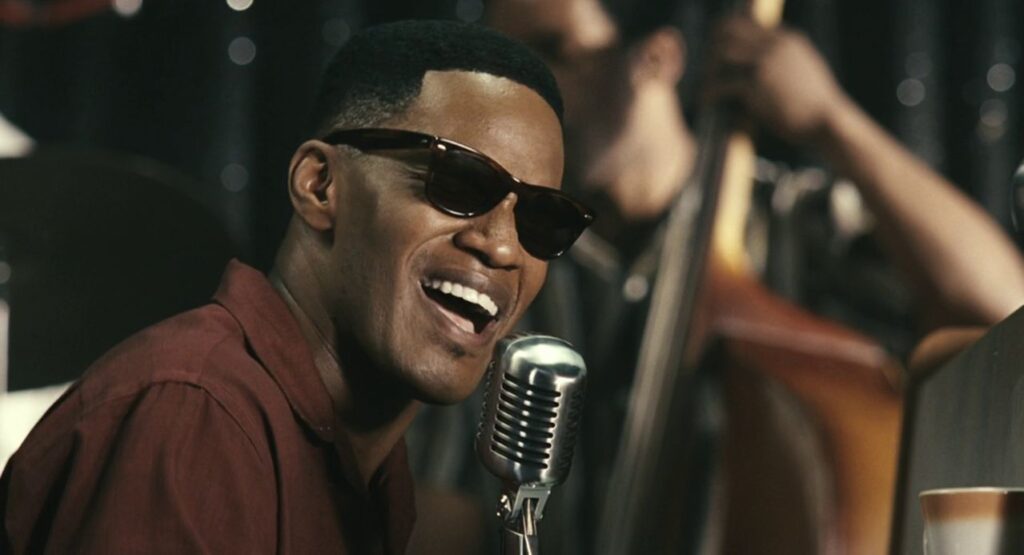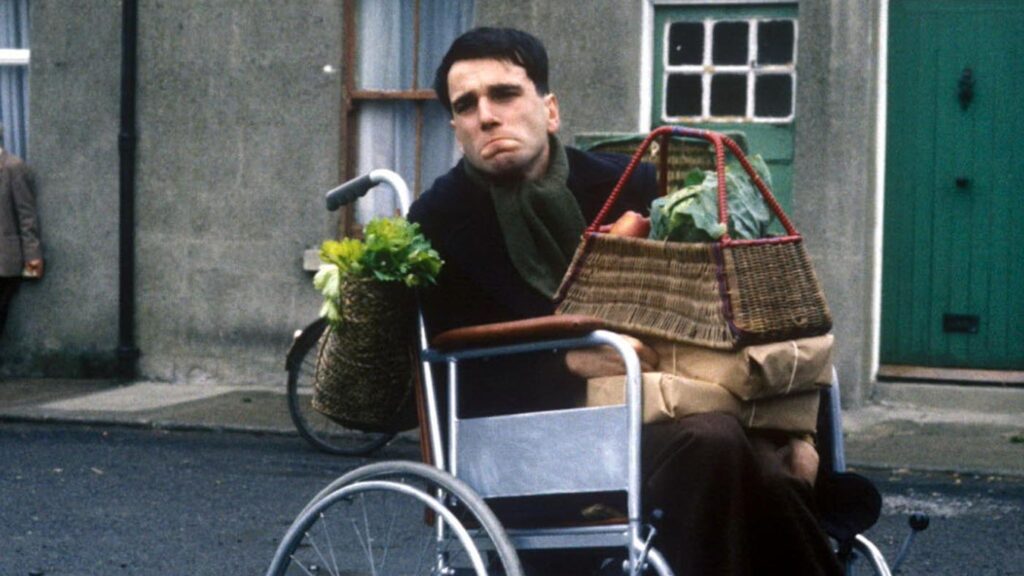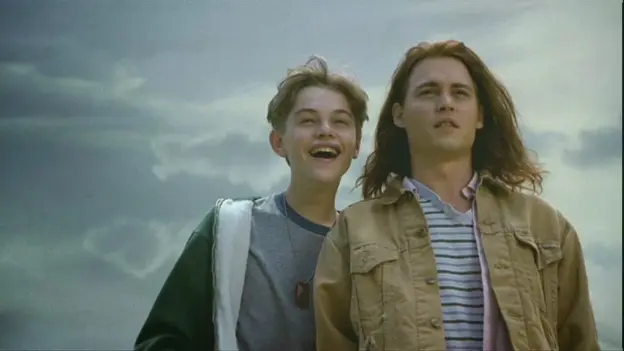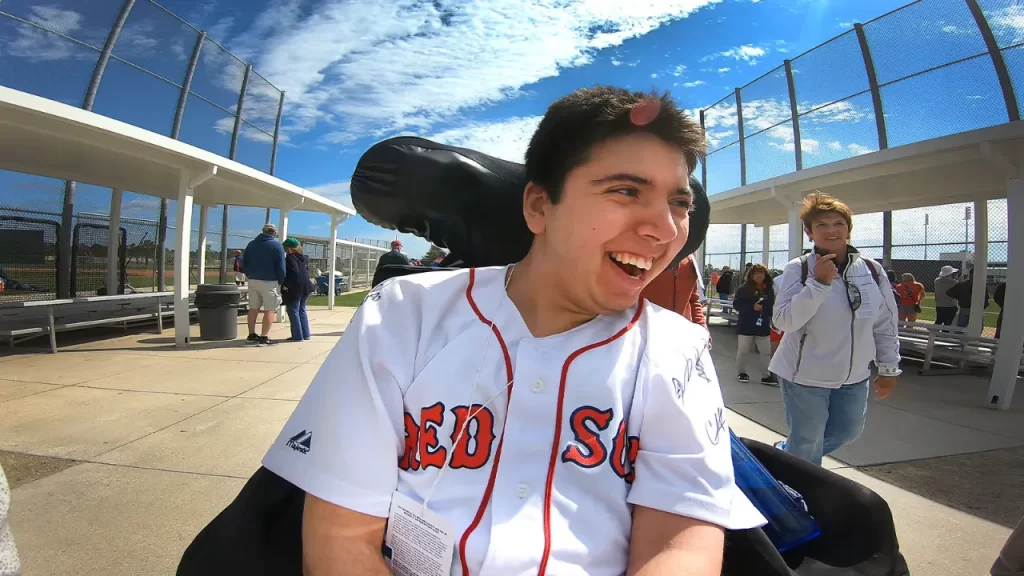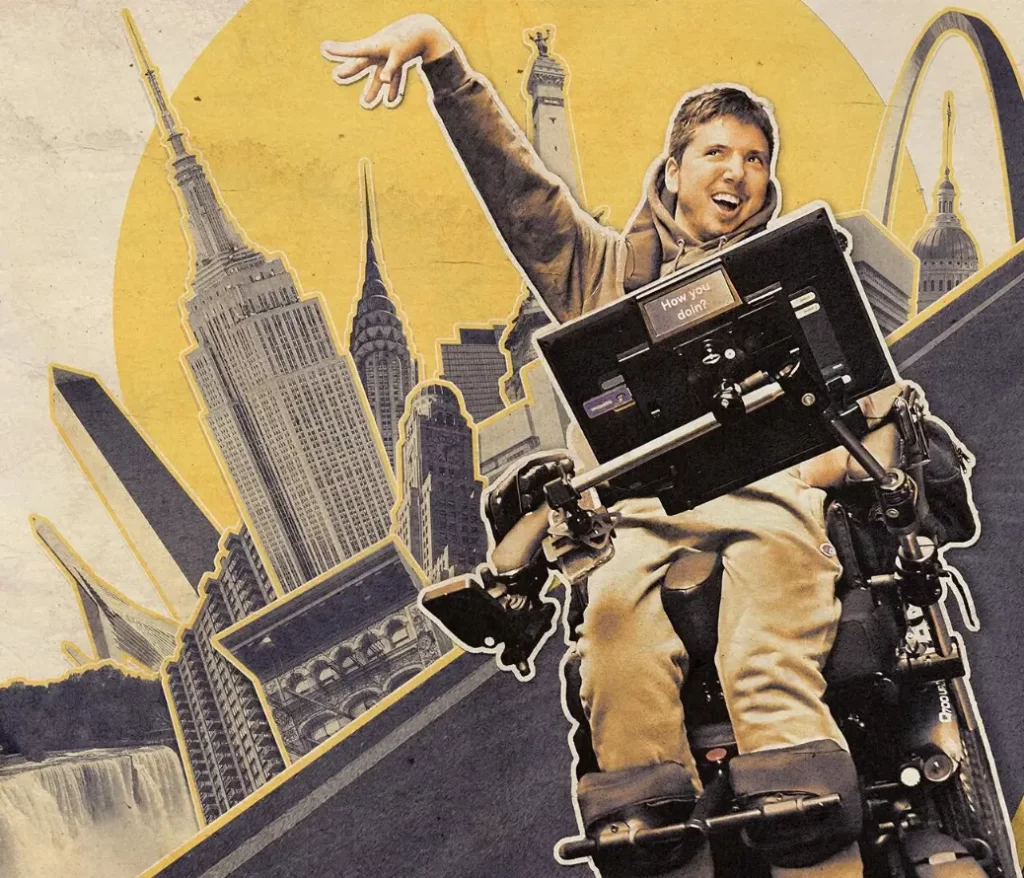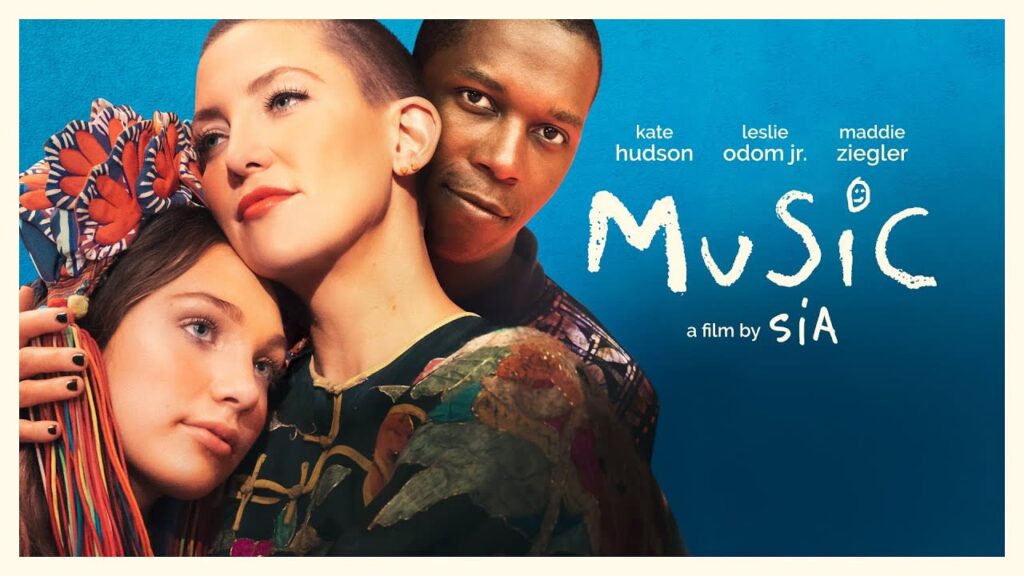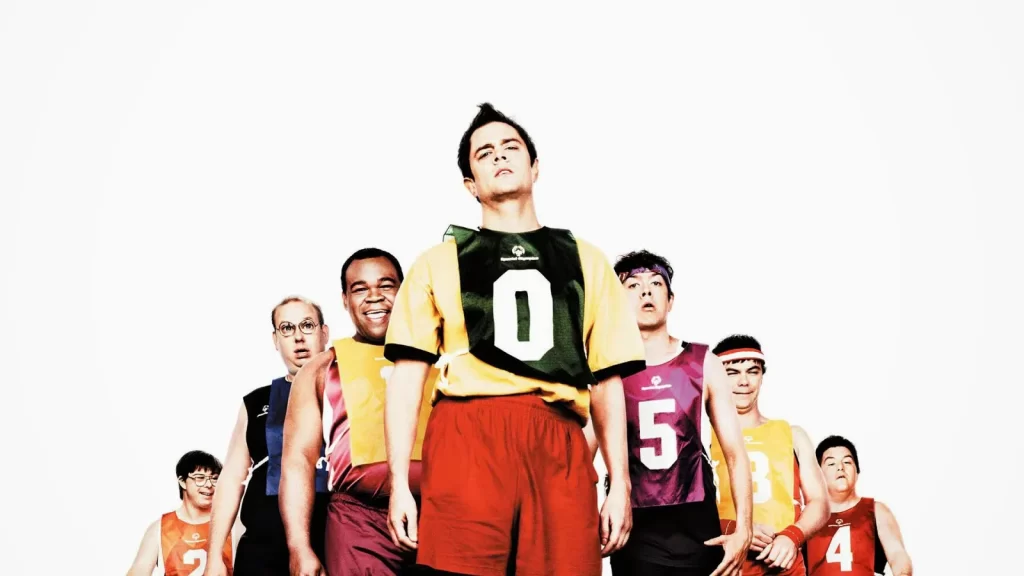A discussion about the persistence of a dream to be an actor, societal presumptions cornering us into a box, and saying the ‘R’ word without saying it. Down Syndrome has many different aspects and personalities as we dive into Zach Gottsagen’s inaugural feature-length film, The Peanut Butter Falcon.
Transcript
Intro
AJ: On today’s episode of Acting Up With AJ and Crew, we’re talking about life imitating
art, super persistence, never giving up on your dream, unlikely relationships, modern
families, and we’re also talking about a very personal connection to the film. Also, me
and Shawnsy get into a healthy debate. Come and join us. I’m your host, Ajani AJ
Murray. I’m chopping it up with my producer, Shawnsy Billops, as we talk about the film
Peanut Butter Falcon. Let’s get into it. It’s Acting Up With AJ and Crew. [electronica
theme music plays through the introduction with lines from the movie interspersed]
TYLER: You need a name. What’s your name?
AJ: It’s so individualized and very much of that person’s personality and needs.
TYLER: What’s rule number one?
ZAK: Party?
TYLER: No, not party.
SHAWNSY: This goes on to the question of the type of caring: autonomy versus safety.
SAM: I’ve been doing this for 38 years and guess what? This is a Make-A-Wish
foundation!
AJ: There are lots of actors that need a whole lot more than we do as actors with
disabilities, and the studios will oblige. But with disability, it’s a problem.
SHAWNSY: It was highlighting the normalization of putting somebody down.
SAM: Peanut Butter Falcon. How about Tweety Bird?
AJ: That sometimes, I would rather work with somebody or have somebody assist me
that doesn’t know anything about disability because there’s no preconceptions.
MC: May I present to you… the Peanut Butter Falconnnnnn! [cheers] [recorded clips and
theme music end]
Backstory to Peanut Butter Falcon
AJ: Okay, Shawnsy, before we get into the deep discussion, I’m gonna give a summary
of Peanut Butter Falcon. It reads, “After running away from his residential nursing home,
a young man with Down syndrome befriends an outlaw who becomes his coach and
mentor.” All right, Shawnsy, let’s get into the discussion for Peanut Butter Falcon.
SHAWNSY: Yeah, this was a, Peanut Butter Falcon was a script written for Zack, giving
him pretty much the role of the same name. They didn’t even change the name for what
they were trying to do.
AJ: Yes. So, let me give a little bit of backstory. So, Zack and Tyler, the director and
writer, they met at Zeno Mountain Farm, which we’ll talk about in an episode. They met
at this place, and they just bonded right away. And Zack actually said, because he knew
that Tyler was into making movies, Zack actually said, “I want you to make me a movie
star.”
[recorded clip from Academy Conversations: “The Peanut Butter Falcon” Featuring
actors Shia LaBeouf & Zack Gottsagen]
PANEL MODERATOR: How did this all come to be? ‘Cause this was really a film written
for Zack.
MICHAEL: Yeah, we’d been volunteering at a camp for people with and without
disabilities in Venice Beach called Zeno Mountain Farms. And Zack, we were making a
short film with Zack, and he was making some really good acting decisions. He was
playing a bad guy. So he said, “I wanna come in. I wanna take my glasses off, set my
drink down, and then say my line, ‘cause that’s what the bad guy would do.” And it was
really good. He was a stand out.
TYLER: We’re like, “That’s genius. You should do that.”
MICHAEL: And then we were having a conversation at dinner, and he said, “I wanna get
into features. I wanna be a movie star.” And we had a real conversation that there’s not
a lot of roles written for people with Down syndrome. And he just said, “Cool, let’s do it
together. You and Tyler write it, and I’ll star.” And we said, that’s genius. Let’s do that.
PANEL MODERATOR: Yeah. [audience laughs] Zack, how are you feeling about this,
your very first film experience? How was Peanut Butter Falcon for you?
ZACK: I would say, I would say, great. Feel good. And I do love this movie, always
having turnout for all for, for all the wonderful audience are here right now. So, thank
you. [recorded clip ends]
AJ: And so, this organic relationship, creative relationship sort of began, and all three of
them wrote this movie together.
SHAWNSY: Yeah, alongside with Michael Schwartz, to write this script. And Shia
LaBeouf’s character is also named Tyler ‘cause Tyler was actually going to play this
role. I don’t know what got Shia LaBeouf into the mix of this, but eventually, Shia
LaBeouf took on that role. But the name did not change from Tyler.
AJ: Right, right.
SHAWNSY: This was a film budget of $6.2 million and went to the box office and made
$23.3, which seems to be a recurring amount with our disability films, at least the ones
that are deemed successful.
AJ: Made for small budgets. So would you say even though it made $23 million, so it
was a profit, but not a huge mega-hit, or at least let’s just say like this, not by
Hollywood’s economics, it was a hit. This was an awesome film and a great story.
SHAWNSY: Now, crazy fact too about this production that we’ve heard through the
grapevine that we don’t know exactly what’s happening with it, but we hear that a studio
had offered $75 million to this budget in order to replace Zack, as the main—
AJ: If Zack wasn’t in the role.
SHAWNSY: —was if it was portrayed by an able-bodied actor. I don’t know what to think
about it, what was truthful about it, but still, the thought of it is off-putting with how well
Zack performed this role.
AJ: And like I said, because this was an organic process of making the movie for him, it
would’ve kind of definitely defeated the point. And they said, this, we’re not doing this
without Zack. And I could imagine it probably wasn’t hard for them. But sometimes, they
might’ve thought for a second, this is $75 mil, but this is for Zack. But it also goes
into—‘cause, I’m sure this happens a lot. This is why we see a able-bodied actor play
disabled roles is because it goes to—it speaks to what people are still thinking about
casting people with disabilities, how it’s gonna be, it’s gonna cost a lot, or we’re gonna
have to hire somebody to be with them. Or they just perceive it as such a nuisance and
such a cost. When, you know, when you wanna cast an actor in a film, there are lots of
actors that need a whole lot more than we do as actors with disabilities, and the studios
will oblige. But with disability, it’s a problem.
SHAWNSY: Yeah, it makes me wonder on if they did recast him, would it have been
Down syndrome, or would they have just changed it to autism?
AJ: No, I don’t know. Because we don’t know, but my hunch is that it wasn’t specifically
about Zack himself. I think they wanted to change the story to a typical boy. That’s what
I think, you know, without knowing the full story, without knowing the facts. ‘Cause we
don’t wanna spread untruths around here. But I just have this guttural hunch that they
wanted to not deal with disability at all. I don’t think it had anything to do with Zack or
Down syndrome specifically. Zak’s relationships to others in the film
SHAWNSY: Yeah, I wonder how that would’ve changed the script, because Zak starts
out the movie being housed by the state in a retirement facility, like, with older folks,
aging in place folks, not Zak, whose character is in his 20s, not 70 years old.
AJ: Yeah. And this is, I’m sure, based on a lot of people’s real experiences. Sometimes
when you’re disabled, sometimes the options are group homes. But a lot of times in
those group homes, you’re not gonna be, you’re gonna be placed with a much older
population who has much different needs than you may have. It’s just he didn’t wanna
be there, and there was no one. Like, Zack was the only one with Down syndrome, and
he was the youngest one there, so—
SHAWNSY: He was the only one with a disability.
AJ: Yeah, yeah, yeah. Like, this nursing home was for an aging population, but for some
reason, the state placed him there. Kind of like institution living, which we, you know, a
lot of that is being done with. But it’s still something that we face today. So it’s not
something that’s completely banished. It’s still something that happens today. Rather
than communal living or living in a group home with your environment or your peers,
you may end up in an institution or a nursing home if you’re disabled.
SHAWNSY: Yeah, it’s really the mindset of side-pocketing the disabled into a corner
where they can, quote-unquote, “be kept safe” and be kept separated, very much
segregated from the rest of the world.
AJ: Yeah. And also, there’s money involved, too. The more bodies you have, the more
state gets money.
SHAWNSY: Yeah, that’s why it really felt like this was a jail system. You know, it was a
business run, funded by the state and was clearly trying to keep him there for the fact of
the money that they’re getting. Like, with the one encounter with the boss, he only cared
that Zack arrived, did not care how, did not want to discuss or do any incident reporting.
Just wanted him back in his bed.
AJ: Yeah, and there was other staff members there too. And there was a night staff
worker and, you know, he didn’t seem to care either. He was doing his job. The only
character that seemed to really care, and maybe a little bit too much—we’ll get into that
later—but the only person that seemed to genuinely care was Dakota Johnson’s
character, Eleanor.
SHAWNSY: Yeah, it seems like we’re discussing the societal treatment of the disabled
in this first conversation that we’re having. And we can just continue with it because that
was an important, like, it was nonchalant and a normalizing with this working force, this
worker calling him the R-word.
AJ: Yeah, yeah. I was pretty upset by it. I know that it happens. And even I was
discussing the film with Shawn, and I was like, for me, it was overreach. I was like,
maybe this is a little extra, but Shawn, you had a different opinion. And then when you
had that opinion, I was like, maybe you’re right. Like you were saying that—
SHAWNSY: It was highlighting the normalization of putting somebody down. The R-
word has always been a moniker, an identifying trait of society putting on the disabled,
and it always makes you feel less than. So, when this worker did it nonchalantly, in a
normal fashion, it hurts even more because it wasn’t even thought about. It wasn’t to put
him down. It was identifying him as less than in this workplace.
AJ: Yeah, he said, I think he said R-word, “time for bed.”
SHAWNSY: Yes, which can’t hurt so much more when they don’t even recognize what
they’re saying. And then it goes on later with the idea of saying the word without even
saying the word. With the situation on the boat with Eleanor and Tyler and Zak, when
they’re sitting on the ocean, and she was pretty much down-talking him and saying, I
know you’re not, you’re saying you’re not hungry, but maybe you should eat something
anyway. Your blood sugar’s going down. You should do this. You should do this. It’s
important to do this. And Shia LaBeouf’s Tyler immediately put a kibosh to this. And it’s
like, don’t do that. Don’t say it without saying it. The way that you’re treating him is
exactly the same fashion as if you were blatantly calling him the R-word.
[recorded clip from the film]
ELEANOR: Hey, Zak, why don’t you sit down, bud? You’re kind of close to the edge. I
don’t want you to fall in. [water sloshing lightly against the boat] Hey, are you hungry?
Have you eaten anything?
ZAK: I am not really hungry.
ELEANOR: Well, maybe you should just have a bite of something for your blood sugar.
TYLER: You don’t want nothing, do you?
ELEANOR: You know how you get, buddy? I have an apple.
TYLER: Hey.
ELEANOR: I have some M&Ms. What?
TYLER: Don’t do that.
ELEANOR: Don’t do what? [long pause]
TYLER: Hey, I got an idea. Why don’t we keep our training going? Just ‘cause we on a
raft, don’t mean we gonna stop training, does it? All right, so we’re gonna do some
breathing control exercises. She’s worried about your blood sugar. We’re gonna
breathe. Take a deep breath in [inhales], out [exhales]. All right. Cool. Now come over
here and put your head underwater. I’m gonna time you.
ELEANOR: What? No, no, no. He can’t do that. Zak, don’t.
TYLER: No, he can do that. He can do that. He can stand up on the…. [voice is muffled
by burbling water] There you go. You better stop calling him a re- [bleep].
ELEANOR: I have never called anyone a that-word.
TYLER: Okay. Hold on. Listen. When people are saying he’s a re- [bleep], what they’re
saying is he can’t do some shit they can do. So you might not be saying the word re-
[bleep], all right. I’ll give you that. But you damn sure is making him feel [bleep]. That
ain’t gonna help his life. [water splashes] Hey, there we go!
ZAK: Time. How long is that?
TYLER: Long.
ELEANOR: Not long enough, Zak. Do it again.
ZAK: Okay. [water bubbles and sloshes]
ELEANOR: You have got some real nerve talking me like that. Do you even know what I
do? I’ve spent the last two years of my life volunteering to hold people’s hands as they
pass away. I talk to them, I feed them, I wipe their asses, I change their clothes, I put
them to bed. And I’m the last person they see. Don’t act like you know jack shit about
me.
TYLER: All right.
ELEANOR: Yeah, maybe he should not be in a retirement home, but I didn’t choose that
for him! But that’s what happened, and now I am doing the best I can. [big splash, then
repeated banging]
ELEANOR: Oh! Oh!
TYLER: Hey!
ELEANOR: Oh!
TYLER: Shit!
ELEANOR: God. Zack! Okay.
ZAK: Yeah!
TYLER: Lunch!
ELEANOR: Zak, did you just catch that with your hands?
ZAK: Yeah!!!
ELEANOR: How’d you do that? You’re a wild man.
ALL: [laugh]
ELEANOR: Oh, my God. [clip fades out]
Disability and caring for others
AJ: Yeah. Because sometimes, in the vein of caring, and sometimes, if you care for
somebody and if you know about their disability, sometimes you can get caught so
much in what you know about the disability itself that the bar becomes lowered even for
the individual within the disability. You know, I’ve had personal experiences in my life
where even friends have lowered expectations for me, or they felt like they’ve had to
take extra care. And sometimes, even though I’m a grown man, I’m 40 years old,
sometimes I’ve experienced, although I know it’s always in love, but sometimes I
experience like a parental sort of caring. And I’ve said, I’ve expressed to them, and I
thought in my mind, it’s like I’ve been raised already. My mother and my parents already
raised me. I just need help with my functioning needs, moving about the world. But I can
make my own decisions.
SHAWNSY: Yeah. So this goes on to the question of the type of caring: autonomy
versus safety. The movie tackled it really, really well and really beautifully, in my opinion,
with the differing characters that were Tyler, who was very much on the extreme of
autonomy and giving Zak everything that he was asking for, and Eleanor being on the
extreme of care and safety and making sure that Zak was safe. Now, there are merits to
both sides.
AJ: Yeah.
SHAWNSY: And it was the marriage between these two cares that both sides start to
realize the best way for Zak to have a full life.
AJ: And I just wanna, ‘cause I wanna make sure that we do this, too, because autonomy
is very important. But I also know if you have, within disability, disability is so broad. And
there are caretakers, loved ones, and siblings and friends who have to step in and have
more of a stronger caretaker role where they make more of the decisions. It is because
their friend or their loved one doesn’t have the capacity to have that autonomy. So, I
want to acknowledge that. I don’t wanna make it seem like we’re bashing people that
need care that way because everybody needs care. All we’re trying to express is
disability is not one thing, and we’re not a monolith. We don’t think the same. We don’t
have the same functioning level or needs. We all have different access needs.
SHAWNSY: Right. And a friend put it really well, to put definitions to it, that our needs
bring us to the same playing field so that we can all play baseball together. We all play
at the game. But once your needs have been met, now we’re all equals, and we should
have the right to decide how we live our lives from that point forward.
AJ: Yeah. And sometimes, I just wanna say, because this may be somebody’s first time
to listen to a podcast about disability. Thanks for listening. But I just wanna say, even
within disability, it’s so individualized and very much to that person’s personality and
needs. You know, I have cerebral palsy. Cerebral palsy is a broad brain injury. Some
people with cerebral palsy are ambulatory. They can walk. Some people with cerebral
palsy cannot. I’m in a wheelchair, and I’m a quadriplegic. Some people with cerebral
palsy are non-speaking, but they’re able to communicate and verbalize, just in different
ways. So, I just wanted to emphasize that even though disability is not just one thing, it’s
very broad. And even with the individual, it’s case by case, person by person, getting to
know people. It’s very much on a one-on-one or once you get to know the person basis.
SHAWNSY: Which is what the movie showed really well, with Shia LaBeouf’s character
being a very much embodying the friend, listening to what Zak was saying, what he
wanted, figuring out how can we make that happen, and making it happen. And then
Eleanor’s character being the other side of that as well. Also being a friend, very much
caring about the safety, about the health of Zak. Now, understanding that the both of
them were actually wrong in some ways as well, and they needed to mesh and meet in
the middle to find the best for Zak.
AJ: ‘Cause on this journey, Zak and Tyler, they meet. And the thing that I also like about
the film is they’re both kind of at this cross points, right? Zak has this dream to be a
wrestler. Tyler’s in some trouble. And two unlikely friends, they meet, but over, and so
they meet on this journey. And so, they’re just getting to know each other. They’re
walking and surviving. But Zak doesn’t let Tyler know that he needs medication or that
he has low blood sugar. That’s where the extra care comes in that Zak didn’t know
about but Eleanor does know about. And she got really concerned and just making sure
that he had the blood sugar was okay and that he was taking his medication.
SHAWNSY: Yeah, and that kind of speaks to the disability of Down syndrome, of Zak’s
character is very much on a path. He knows what he wants but doesn’t necessarily think
about those other things. So there was no way of Tyler knowing about any of those
situations that are needed. He just saw a friend that needed to go somewhere and was
willing to get him there. He did recognize that he couldn’t swim and sort of taught him
how to swim.
AJ: Yeah.
SHAWNSY: And that’s kind of part, that was also kind of what Music was about. Music
was very much about not knowing anything and getting thrown into a situation that’s a
little bit over your head but figuring it out as you go and learning.
AJ: Can I say? Because I also thought about this, not to just go on and on. But
sometimes, it’s been my experience that I would rather there’s people that you work with
within the disability field, and I’m not knocking them at all, but there’s people that have
lots of experience. They’ve been helping people for like 20, 30 years, or this is what
they’re training, and there’s some people that don’t know anything about disability. It’s
been my experience, and this is my personal experience, that sometimes I would rather
work with somebody or have somebody assist me that doesn’t know anything about
disability because there’s no preconceptions.
SHAWNSY: Right. That was in Eleanor’s character of knowing everything that Zak
needed and not listening to Zak.
AJ: Yeah.
SHAWNSY: And that’s part of the autonomy of you having the right to tell your caretaker
how to do it and how to do it properly in your way.
AJ: And one of the things, you know, me and Shawn met through the same organization
that we’ll talk about later. But one of the excellent things that I think that we as a
community do, of course, safety is a priority, but it’s all about making sure that we as a
community do things that maybe we don’t get a chance to do with each other. Some
people like me with disabilities have never done some opportunities, so Zeno comes
together and makes sure we do those opportunities. But there’s no pre-discussion
about, “this is the person’s disability.” A lot of times, the people that are paired with us
don’t know anything about it unless it’s a serious medical thing. They don’t just throw us,
it’s not like being thrown in a pool. But they don’t go out of their way saying, “This
person has Down’s, or this person has CP or autism.”
SHAWNSY: Right. And it’s very much a learning process on how to listen and that you
are your best expert on you.
AJ: Yes, yes.
SHAWNSY: Now, some people don’t have that ability to verbally talk about what they
need, but it’s still of being aware of what they’re doing and recognizing what’s the safest
way to get them back to that equal playing field that we all wanna be playing on.
News Feed
[chill music break]
AJ: And now it’s time for today’s News Feed with Cheryl Green. Cheryl, you have a
story about the number of people being dropped or kicked out of Medicaid post-COVID.
What’s going on with this? [epic news theme music]
CHERYL: We recently did the story about the Census wanting to change the questions
about disability and how they hadn’t talked to any actual disabled people. And recently,
some more news came out saying that the Census Bureau has put that whole change
on hold. I think they probably were responding to community outrage about that, so
that’s great. But the story I have for you today is not so upbeat. It’s from February 22nd,
2024, called Halfway Through ‘Unwinding,’ Medicaid Enrollment Is Down About 10
Million People by Phil Galewitz, KFF Health News. That’s Kaiser Family Foundation.
“Halfway through what will be the biggest purge of Medicaid beneficiaries in a one-year
span, enrollment in the government-run health insurance program is on track to return
to roughly pre-pandemic levels.
Medicaid, which covers low-income and disabled people, and the related Children’s
Health Insurance Program grew to a record 94 million enrollees as a result of a rule that
prohibited states from terminating coverage during the nation’s public health emergency.
But since last April, states have removed more than 16 million people from the
programs in a process known as the ‘unwinding,’ according to KFF estimates compiled
from state-level data.
While many beneficiaries no longer qualify because their incomes rose, millions of
people have been dropped from the rolls for procedural reasons like failing to respond
to notices or return paperwork. But at the same time, millions have been reenrolled or
signed up for the first time.
The net result: Enrollment has fallen by about 9.5 million people from the record high
reached last April, according to KFF. That puts Medicaid and CHIP enrollment on track
to look, by the end of the unwinding later this year, a lot like it did at the start of the
coronavirus pandemic — about 71 million people.
‘What we are seeing is not dissimilar to what we saw before the pandemic — it is just
happening on a bigger scale and more quickly,’ said Larry Levitt, executive vice
president for health policy at KFF.
Enrollment churn has long been a feature of Medicaid. Before the pandemic, about 1
million to 1.5 million people nationwide fell off the Medicaid rolls each month —
including many who still qualified but failed to renew their coverage, Levitt said.
During the unwinding, many people have been disenrolled in a shorter time. In some
ways — and in some states — it’s been worse than expected.
The Biden administration predicted about 15 million people would lose coverage under
Medicaid or CHIP during the unwinding period, nearly half due to procedural issues.
Both predictions have proven low. Based on data reported so far, disenrollments are
likely to exceed 17 million, according to KFF — 70% due to procedural reasons.
But about two-thirds of the 48 million beneficiaries who have had their eligibility
reviewed so far got their coverage renewed. About one-third lost it.
The federal government has given most states 12 months to complete their unwinding,
starting with the first disenrollments between last April and October.
Timothy McBride, a health economist at Washington University in St. Louis, said the
nation’s historically low unemployment rate means people who lose Medicaid coverage
are more likely to find job-based coverage or be better able to afford plans on
Obamacare marketplaces.
‘That is one reason why the drop in Medicaid is not a lot worse,’ he said.
There are big differences between states. Oregon, for example, has disenrolled just
12% of its beneficiaries. Seventy-five percent have been renewed, according to KFF.
The rest are pending.
At the other end of the spectrum, Oklahoma has dumped 43% of its beneficiaries in the
unwinding, renewing coverage for just 34%. About 24% are pending.
States have varying eligibility rules, and some make it easier to stay enrolled. For
instance, Oregon allows children to stay on Medicaid until age 6 without having to
reapply. All other enrollees get up to two years of coverage regardless of changes in
income.
Jennifer Harris, senior health policy advocate for Alabama Arise, an advocacy group,
said her state’s Medicaid agency and other nonprofit organizations communicated well
to enrollees about the need to reapply for coverage and that the state also hired more
people to handle the surge. About 29% of beneficiaries in Alabama who’ve had eligibility
reviews were disenrolled for procedural reasons, KFF found.
‘Things are even keel in Alabama,’ she said, noting that about 66% of enrollees have
been renewed.
State officials have told the legislature that about a quarter of people disenrolled during
the unwinding were reenrolled within 90 days, she said.
One of a handful of states that have refused to expand Medicaid under the Affordable
Care Act, Alabama had about 920,000 enrollees in Medicaid and CHIP in January 2020.
That number rose to about 1.2 million in April 2023.
More than halfway into the unwinding, the state is on track for enrollment to return to
pre-pandemic levels, Harris said.
Joan Alker, executive director of the Georgetown University Center for Children and
Families, said she remains worried the drop in Medicaid enrollment among children is
steeper than typical. That’s particularly bothersome because children usually qualify for
Medicaid at higher household income levels than their parents or other adults.
During the unwinding 3.8 million children have lost Medicaid coverage, according to the
center’s latest data. ‘Many more kids are falling off now than prior to the pandemic,’
Alker said.
And when they’re dropped, many families struggle to get them back on, she said.
‘The whole system is backlogged and the ability of people to get back on in a timely
fashion is more limited,’ she said.
The big question, Levitt said, is how many of the millions of people dropped from
Medicaid are now uninsured.
The only state to survey those disenrolled — Utah — discovered about 30% were
uninsured. Many of the rest found employer health coverage or signed up for subsidized
coverage through the Affordable Care Act marketplace.
What’s happened nationwide remains unclear.”
This is really heartbreaking because for anybody who has ever had to fill out this
paperwork, I mean, this is a part-time, if not full-time, job to track down all this
paperwork and take care of it. And then you’ve got the backlogs, and it’s hard to reach
people. And maybe somebody has moved or lost their housing altogether, and they’re
not receiving their mail, they’re disenrolled, due to not turning in their paperwork on
time, but they otherwise would qualify. It’s just sickening. Or what about people who
have acquired a disability, maybe like a brain injury that affects their ability to focus and
concentrate and fill out paperwork and submit it on time. These are the kinds of folks
who often get denied for disability benefits for failing to fill out the paperwork properly,
which is sometimes a sign that they desperately need those benefits. And I know the
same thing can happen with filling out your insurance paperwork. It can be hard for
some people. The platforms can be inaccessible. So it’s not an uplifting news story, and
I really hope this one stat that I read in there about people being re-enrolled within 90
days, I really hope that that is a defining feature of this unwinding and that people can
get back on and get healthcare coverage. All right, AJ, well, back to you and the crew.
[news theme music fades]
Zak, wrestling, and fantasy versus reality
AJ: Yeah. So now, we’re gonna get into wrestling, so.
[recorded clip from TV wrestling]
MICHAEL BUFFER (ring announcer): Lllllllllet’s get ready to rumble!!!! [crowd cheers
along, then clip ends]
AJ: So Zak is a big fan of wrestling, and he’s a big fan of this really specific wrestler who
was famous back in the day called Salt Water Redneck, and—
SHAWNSY: Famous? I don’t know. He had a VHS tape in this retirement home. I don’t
know how famous he was, but in Zak’s mind, 100% a hero.
AJ: Well, maybe at a time. I mean, Zak had to see him somewhere. So, maybe not
world famous, but semi-famous. Well, at least in Zak’s circles. But Zak has this VHS
tape, and Salt Water Redneck has his training school for wrestlers, and Zak really wants
to go. That is his ultimate goal to go.
SHAWNSY: Let’s go all the way to the point, you know. We don’t, we’ve already
discussed the movie itself. Let’s go all the way to the point. So yes, he’s a fan of this
wrestler, wants to go to this wrestling school, and they show up at this man’s doorstep.
AJ: Yeah. And we found out that it is his address, but he’s retired. He shut the school
down about ten years ago at this point.
SHAWNSY: Which is totally heartbreaking. And watching Shia LaBeouf, Tyler’s
character, come to the realization that he’s going to have to tell Zak that he doesn’t
exist, that this whole movie that they’ve been building up to, and Shia LaBeouf’s
character, Tyler, has been leading into and building up this whole momentum that it’s
gonna be this epic thing, to find out that this man living in the trailer hasn’t done the
character in ten years.
AJ: And they’ve been through a lot. They’ve been in the water, they’ve been shot at,
they’ve been hitching rides, and they’ve been through a lot to get to this journey. And
they come to this point, and it almost seems like it’s not gonna happen. Their journey
stops here, or that’s what it seems like.
SHAWNSY: Yeah. But little do we know, right after they leave, the Salt Water Redneck
puts on the gear, puts on the face makeup, hops in his hot rod, and drives off to catch
him.
AJ: In a badass hot rod, by the way, like zoom. And you just felt like even when I saw
him pull up, I just got so happy, and I got a burst of energy ‘cause I’m like, it’s on! And
Zak says something like, “I told you he was here.”
SHAWNSY: Right. Which makes us talk about the discussion of fantasy versus reality.
And in Zak’s mind, Salt Water Redneck was a real person that existed in this world
because there was proof on the tape. He said it multiple times: “I have proof on a VHS
tape.”
AJ: I think he said, “I’ve seen thousands of shows.” He knows this to be true.
SHAWNSY: Well, he, so, and it’s even in the beginning of the movie, the old man that’s
his roommate is like, “We’ve watched this a dozen times.” So it’s like, I don’t know if you
had this growing up, but I personally had some VHS tapes that I would have on loop. 3
Ninjas was one of those movies, like 3 Ninjas Knuckle Up. All those kind of kids movies,
I had them on repeat.
AJ: All the time for me. It was probably Ghostbusters and Teenage—
SHAWNSY: [laughs]
AJ: —Teenage Mutant Ninja Turtles and definitely, definitely Power Rangers, either the
series on VHS or the movie. Those were my go-tos, and I would watch them so much
that I could almost pop the tape.
SHAWNSY: Now, Zak was in the same mindset. So, walking away from the Salt Water
Redneck—I think they called him Glenn. I think his name was Glenn, or I could be
wrong—but they introduced him to Zak and said, hey, this guy’s name’s Glenn. This is
who lives here. And Zak even said hello, didn’t recognize him, just said hello, and then
they started walking away. But Zak never stopped saying, like, wouldn’t get in that he
was, that the Salt Water Redneck wasn’t real. He was still real. They just hadn’t found
him yet.
AJ: Yes, yes. And which shows you about determination and persistence.
SHAWNSY: And it really is kind of an insight ‘cause I have a friend that has Down
syndrome that does have those moments where if it’s, especially with dates and with
events that are happening that he knows are going on, that’s, it’s a very streamlined
direction. Like, there’s no veering off of it. That’s what’s happening. That’s what’s going
to be going down.
AJ: And doesn’t this friend, I know this friend as well. He’s our mutual friend. This friend
writes the dates down.
SHAWNSY: It’s one of those things as well that when you say yes to something, like
Shia LaBeouf’s Tyler character did, that that is set in stone. That’s as much as writing
the signature down on a contract with Zak, that we are doing this, and this is going to be
happening, and I can’t wait for it to happen. But there’s nothing stopping us from getting
to that point until we get there.
AJ: I very much have that mindset too. I’m very much like that too. I don’t know if it has
anything to do with my disability, but I feel that way too. Like, I take people at their word,
and if they say they’re gonna do something, we’re gonna do it. And I get so excited, and
I can’t wait until we do the thing that they said that we’re gonna do. And then if we, I
know things happen, but if we don’t do it, I’m like, you know, why? You said, you know?
SHAWNSY: Right. You hold people to their word. And that’s the same kind of black and
white that Down syndrome sees. And they see yes as a yes, no as a no. It’s amazing to
watch ‘cause you start to see fantasy become reality. That they saw Zak, and it brought
Salt Water Redneck back to life, that he, it seemed like that character was there and
was real because Zak was so adamant about it being real and it brought it, manifested it
into life.
AJ: Yeah. And for me, I don’t know. What did you say Salt Water’s real name was?
SHAWNSY: I think it was Glenn.
AJ: And so, for me, or what I picked on, or how I took it is like Zak making his reality
real, and believing in him so much gave Glenn so much of a spark, and it brought Salt
Water back, to his mind and his spirit, you know.
SHAWNSY: Right.
AJ: To me, and maybe I’m reading more into it, but it seemed to put a fire up under Salt
Water.
SHAWNSY: Yeah, yeah. Like, it became reality, and which goes to the question on living
a full life, that Zak’s dream in this movie was to become a professional wrestler, to go to
this wrestling school by his hero and to do this thing. And even though it wasn’t real in
the minds, it hadn’t been around for ten years, that it came to be to allow Zak to have
this fulfilling moment, this groundbreaking achievement in his life.
AJ: And also, he had another dream that was very important. It was a little more subtle
in the movie, or I would say it was like a #2 or maybe like a, I don’t know if sub-dream is
the right thing, but he really wanted a family. And by the end of the movie, this is why I
said at the top is modern family, is because they become a modern family. You know,
we can’t talk about the whole movie, but speeding along, Eleanor and Tyler, they get
chummy, and they become an item. And they, at the end, they become their own
modern family.
SHAWNSY: I don’t necessarily, I feel like that was not a, like, not searched after. It was
just found, like treasure you weren’t looking for.
AJ: Yeah. I meant, like, kind of organically. But there’s a scene in the movie where Zak
does talk about, like, me and you could have a family. He does begin to talk about that.
But to your point, it is organically. That isn’t from his very first goal, which is the wrestling
school from the very beginning. But sort of in the middle, sort of organically because
he’s building these relationships, they become a modern family.
Content Roundup
[chill music break]
AJ: And now let’s go over to your Content Roundup. Here’s friend of the podcast, Adam
Grimes. Adam, what do you have for us today?
ADAM: Thank you, AJ. Well, today we have an article by Shaun Heasley writing for
DisabilityScoop.com titled With New Season, ‘The Good Doctor’ Adds Character With
Autism.
“An actress with autism is set to take on a prominent role in a prime time network
drama.
Kayla Cromer, who is on the spectrum, will join ABC’s The Good Doctor for its final
season.
The series focuses on the experiences of Dr. Shaun Murphy, a surgeon with autism.
Cromer will play Charlene ‘Charlie’ Lukaitis, a third-year medical student with autism.
Charlie is excited to work with Murphy who she’s idolized since seeing a viral video of
him saving a boy’s life.
While The Good Doctor delves into how the developmental disability affects Murphy, the
show has been criticized for starring Freddie Highmore, an actor without autism, as
Murphy.
Still, The Good Doctor has brought significant visibility to autism, with the show
attracting more than 6 million viewers during its 2022-2023 season alone. And a 2019
study found that watching even a single episode of the show yielded more accurate and
positive knowledge about autism than a college lecture on the topic.
Cromer made history in 2020 when she starred in Freeform’s Everything’s Gonna Be
Okay. With her role on the show, which ran two seasons, she became the first person
on the spectrum to play a character with autism in a series regular role on American
television.
‘Words cannot express the overwhelming gratitude I feel as I take on the role of
Charlotte ‘Charlie’ Lukaitis, on The Good Doctor. I love her and I know you will too!’
Cromer posted recently. ‘It’s truly an honor to bring authentic representation to the show
and viewers.’
The seventh and final season of The Good Doctor will premiere Feb. 20 at 10 p.m. ET
on ABC.” Again, this article was written by Shaun Heasley from DisabilityScoop.com,
and back to you guys.
AJ: As Adam just said, you can catch The Good Doctor Tuesdays at 10/9 Central. Audio
description and closed captioning are available. Now just as an aside, if you wanna
check out some more of Kayla Comer’s previous work, you should check out the show
Everything’s Gonna Be Okay. It previously aired on Freeform for two seasons. You can
now check those two seasons out on Hulu. Closed captioning is available. Audio
description is not available, but it’s still a really good show.
And I don’t know how we do it, but we need to advocate for all shows, even canceled
ones or ones that are no longer airing, to have all the access that’s possible. Again, this
show is called Everything’s Gonna Be Okay, and it’s absolutely incredible. The writing is
so witty and weird and kooky, but I mean all those things in the most positive way. I’ve
never seen a show like this. Now back to more Peanut Butter Falcon and Acting up With
AJ and Crew. [music fades]
Wrestling and autonomy
SHAWNSY: He trains him for a day. And then as they’re sitting around eating, eating
dinner, or drinking some drinks, he brings up the fact of why don’t you wrestle in a real
match? Now that you’re a professional wrestler, why don’t you come to this backyard
wrestling match, and we will put it on for you? Now, the debate right now is the
opponent that was wrestling against Zak certainly was shown out to be the sort of
antagonistic persona of would kind of be abusive, right? Like, of somebody going too
hard, or was it too hard?
AJ: So, from my, my opinion is yes, he treated Zak as if he was a real wrestler and had
all this training. But let me say, for me, he went too hard and treated Zak as a
professional wrestler. And the reason why I said he went too hard is not at all because
he has Down syndrome or like he can’t do it because of his Down syndrome. I felt like
that because this is a person that doesn’t, you know, he’s a fan of wrestling. He wanted
to go to the school. Maybe he’s been doing a little exercises, maybe some moves that
he learned, but he’s not a wrestler. He wants to be a wrestler. And he was put in a real
scenario. But it’s kind of like if a fan wins a raffle thing, and it’s like, you could be a
baseball player for a day, you think a pitcher is actually going to treat the fan like a real
player? Not exactly, because they’re not professional. That has nothing to do with
putting them down, but they don’t do this every day.
SHAWNSY: Yeah. This was on whether treating Zak like an adult or like a child in this
scenario, on giving him the rundown, showing him what’s what, but not letting him have
a challenge. That was what I saw out of this film, like, with the class that went on the
day before where Zak was clearly like, I would like to lift him up and throw him out of the
ring. And Salt Water Redneck was like, you know, that was just a film trick. That wasn’t
actually real. That’s not, let’s do some easier stuff. We’ll just do a headlock tie up, and
we’re just gonna act like we’re doing such. And then to take this person that’s only
trained for a single day and be like, hey, my friend here who’s been wrestling for 27
years, why don’t you wrestle him? We’ll do a real match, and you’ll be good. And I could
visibly see the offense that this wrestler who’s been taking it seriously for 27 years was
like, are you kidding? Like, I’m a professional, and you’re going to just throw me in with
the shlock? You’re just gonna throw me in with somebody that’s never done it before,
and you want me to go easy on him, to be nice to him?
This is on the topic of lowering expectations for people with disabilities so that they don’t
know failure, I guess. That, like, we’re gonna just lower the bar so that they don’t get
upset for not achieving it. But it takes away that jump to get to that higher point of the
reason why he always wanted to do it. And I think it was harsh, but I also liked the fact
that that character was kept that way because it allowed Zak to reach that higher bar.
‘Cause in the film, and this might be another super crip controversial moment, Zak’s
character literally lifts him up and throws him, rather non-spectacularly. [laughing] It was
like clearly a wire and everything. But it was amazing and hilarious on like, yeah, he did
the move that he always wanted to do in a wrestling match.
AJ: So, from that standpoint, I could see, you know, without that, there’s no payoff. So I
could see the reason for it. I was just saying, like, I just, and again, this has nothing to
do with his disability, but I just felt like it was kind of harsh. But I get the beats and stuff
for the story, but it’s kind of like to me, as I think about it, if you’re teaching a person how
to fly, are they gonna fly to another country all by themselves? No, you’re gonna be with
them, and you may fly around a certain range in the area, but you’re not gonna be a
professional pilot.
SHAWNSY: Yeah. And in one day’s time, there’s no way that you’re going up in an
airplane by yourself to fly the plane itself after one day’s training. No. Like, you do all the
off, on-the-ground stuff first. You need to train to get to that point.
AJ: Right.
SHAWNSY: And it felt like Salt Water Redneck was trying to do this fantastical fake
match for Zak. And it kind of was nice to see this man offended by the fact of like, no,
I’m not gonna baby him. I’m gonna kick his ass. And to allow Zak that moment to be
able to stand back up on his own two feet and hurl this man out of the ring.
AJ: In a way, I do concede that he was like, I don’t care. I don’t give a damn if you’re
younger. I don’t care if you’re disabled. You know, you wanna be a wrestler? As Kevin
Hart would say, “You gon’ learn today,” you know?
SHAWNSY: Right.
AJ: So that was his mindset. And so, on that point, I do see what you’re saying.
SHAWNSY: I think they needed that ‘cause also, Shia LaBeouf’s character, and
Eleanor, Dakota’s character, was also having this debate, is like, we need Eleanor’s like,
we need to cancel this match. And Shia LaBeouf cuffed her to the steering wheel.
AJ: Yeah, yeah.
SHAWNSY: Well, it shows on with Tyler being on his side of the ring and being there
and being in his corner and being in Zak’s corner, you know, setting up with his
cardboard attire and getting him his moment and letting him come out in his fashion and
get ready for the match. He wasn’t trying to make it safe for him. He just wanted him to
have the best time of his life. I don’t know. So I think it was good to have that
antagonistic character so that Zak could rise to the occasion.
AJ: You need that, and you do need that. That makes for good, that makes for great
storytelling.
SHAWNSY: And that’s for people with disability every day. You know, like, we don’t
need to structure their lives for them. We need to just give them the playing field for
what they want and then allow them the chance to achieve it for themselves.
AJ: Right. I agree.
SHAWNSY: Is there anything else you want to add to this?
AJ: I just wanted to say, I love the film. If I didn’t know it, I would’ve thought that this film
was a very much, it was so good. I love the cinematography, and I would’ve thought that
this was a novel. This is very much, like, it feels, I don’t know if I’m explaining right, but it
feels like a novel. It flows like a novel. The music was really good. The cinematography
is beautiful. So, if you haven’t seen the film, check it out. And it reminds me of, and this
is what we’re gonna stop for this, there’s a movie with Kevin Costner. I think he kidnaps
a little boy.
SHAWNSY: Are you talking about A Perfect World?
AJ: Yeah, A Perfect World. It just, you know, it’s not the same story at all. But that type
of flow of the movie, the way the music was, and just the similar thread they had to it is
the chemistry of the relationship. You know, by the end, they really loved each other,
and they really went on these different adventures, and they both taught each other
things. And I told Tyler that it was like, thank you. I feel that way, too. It’s a beautiful film.
Like I said, check it out. It’s streaming on Hulu right now. Peanut Butter Falcon.
Disability Spotlight
AJ: [chill music] Cheryl Green is back in the house with Disability Spotlight. Cheryl.
CHERYL: Hey, AJ! I got a story that’s a little bit on the older side, but I think it’s
evergreen, and it still holds up. This is from the ABC website from Thursday, December
15th, 2022. The story’s called Pasadena Tailoring Shop Specializes In Alterations For
People With Disabilities. Pasadena, California KABC.
“Misty Diaz works as a model and said she has a closet full of clothes that she couldn’t
wear. Before she met the co-founders of Sewn Adaptive in Pasadena, she had only
about two pairs of jeans that she felt comfortable in. Now, she has clothes that fit her
disability.
‘I’m able to be my true authentic self,’ said Diaz. ‘I’m able to show who I am and that’s
like loud and that's like bright and shiny."
The co-founders of Sewn Adaptive both have backgrounds in design and fashion and
after working on a fashion show together, they saw a real need for tailoring and
designing for people with disabilities.
‘Our worlds were just turned upside down,’ said Alexander Andronescu, one of the co-
founders of Sewn Adaptive. ‘We were like, “We need to do this full time.” We would just
tell each other every day, “Lynn, how can we figure out how to do Sewn Adaptive full
time?”’
‘We had no idea how much the fashion industry has kind of ignored this demographic,’
said Lynn Brannelly.
The co-founders said what started out as Instagram posts to give tips to people sewing
at home has blossomed into a brick-and-mortar shop and the first adaptive tailoring and
alteration shop specializing in work for people with disabilities.
‘I’ve had so many surgeries on my back and this isn’t just a Misty problem,’ said Diaz.
‘Those with disabilities have had surgeries in certain areas and need comfortability and
they were able to provide that.’
‘There’s no reason why all of us shouldn’t feel confident,’ said Brannelly. ‘There's no
reason why all of us shouldn’t get to be fashion forward and that’s our mission.’
‘I’m finding out this parallel universe that has existed next to ours for so long,’ said
Andronescu. ‘It’s beautiful.’”
And while we’re on this topic of fashion, I would love, AJ, to point people to Rebirth
Garments, which was founded by Sky Cubacub. And there is some really exciting
clothing happening there, all custom made. And from their website they say, “Rebirth
Garments are gender non-conforming wearables and accessories centering Non-binary,
Trans, Disabled and Mad Queers of all sizes and ages.” They’ve just got some
incredibly beautiful stuff on that website, really bold colors and great shapes. I would
encourage folks to check out RebirthGarments.com. And they have up on their home
page right now, “Until further notice, 25% of all sales and 100% of Palestine themed
sticker sales are going to Seraj, a 20 year old student from Gaza who has been forcibly
displaced in the camps in Rafah.” They also have on their homepage links to donate
directly to Palestinian folks in Gaza and to donate eSIMs, which is something you can
also learn more about on Alice Wong’s Disability Visibility Project, the eSIMS for Crips in
Gaza project. [music fades]
Wrap-up
[epic theme music]
AJ: Thanks for joining us for another episode. We really hope you enjoyed it. We really
enjoyed producing it for you. So, for Shawnsy Billops, Cheryl Green, technical producer,
and myself, Ajani AJ Murray, come and join the crew next time for another episode of
Acting Up With AJ and Crew. Our next episode, we’re gonna be talking about the movie
My Left Foot with our guest, Adriana Mallozzi. [music fades]
Peanut Butter Falcon is available for streaming on Amazon Prime Video. Closed
captioning is available for access needs. Audio description is not available. And I would
just like to take a moment right here and now to say to the audience that if their
particular access needs that me or you need, let us not be afraid to use the good power
of social media. Use your platform to post or tweet out to these companies saying,
“What’s up with this access, and when can we get it?”
